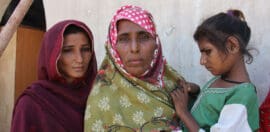UK issues sex ban for aid workers

30 October 2020 at 4:40 pm
It comes after more than 50 women recently accused aid workers of demanding sex for jobs during the Congo Ebola outbreak
The UK is banning sexual relations between government staff giving aid and humanitarian aid beneficiaries, in the wake of numerous sex scandals afflicting the sector in recent years.
Thomson Reuters Foundation has reported that sexual relations between Foreign, Commonwealth and Development Office (FCDO) staff and aid beneficiaries will be treated as potential misconduct.
FCDO has also barred staff exchanging money or jobs for sex, sexual relationships founded on “inherently unequal power dynamics”, and those between staff and aid project partners.
Nigel Adams, FCDO minister of state, said in a letter that these actions were considered unacceptable.
“We will not hesitate to take swift action if any staff member or any organisation we work with fails to uphold our strict standards,” Adams said.
It is believed these guidelines will only apply to those directly employed by UK government departments, and not charity workers on government contracts.
But it has been reported that funding agreements with NGOs would be voided if evidence of sexual harassment, exploitation or abuse was uncovered.
While previous official guidance stated that sex with aid beneficiaries was only “strongly discouraged”, the sector has come under increasing pressure in recent years amid numerous scandals.
UK lawmakers heard evidence earlier this month detailing allegations from more than 50 women, who accused aid workers of demanding sex for jobs during the 2018-2020 Congo Ebola outbreak.
It was also revealed in 2018 that Oxfam staff members, who were deployed in Haiti to provide aid, paid earthquake survivors for sex.
Australia’s aid sector steps up safeguarding practices
The Australian aid sector has not been immune to abuse allegations.
The Australian Council for International Development (ACFID) announced an independent review into the prevention of sexual misconduct in Australia’s international aid sector in 2018.
This review surveyed close to 120 organisations and found that out of the 76 incidents reported by organisations over a three-year period, there were 31 substantiated cases involving aid workers from 20 organisations.
In the final report, the review recommended that ACFID member organisations adopt measures to prevent and respond to transactional sex in field work by making changes to codes and policies.
Unlike the UK, ACFID has had a code of conduct for its members for over 20 years.
This code of conduct states that members should demonstrate their organisational commitment to the prevention of sexual exploitation and abuse, through a survivor-centred approach.
An ACFID spokesperson told Pro Bono News that the Australian aid sector had strong safeguards in place.
“Through the ACFID code of conduct, members are required to have their own code specifying the values and expectations of professional conduct of all staff and volunteers,” they said.
“This must specifically reference transactional sex and applies alongside a broad suite of safeguarding requirements.”
The Department of Foreign Affairs and Trade (DFAT) also has made efforts to address sexual misconduct in the sector.
DFAT’s latest Preventing Sexual Exploitation, Abuse and Harassment Policy notes that after a crisis, people may engage in transactional sex – the exchange of money, employment, goods or services for sexual acts – to generate income and meet basic survival needs.
Through this policy, DFAT prohibits transactional sex in the field for all staff and downstream partners while engaged in the delivery of DFAT business in “very high risk” settings.
This ban also includes prohibiting fraternisation– any relationship occurring while conducting business, that involves (or appears to involve) preferential treatment or improper use of position – for all non-national personnel in the field.
Pro Bono News has approached DFAT for comment.







